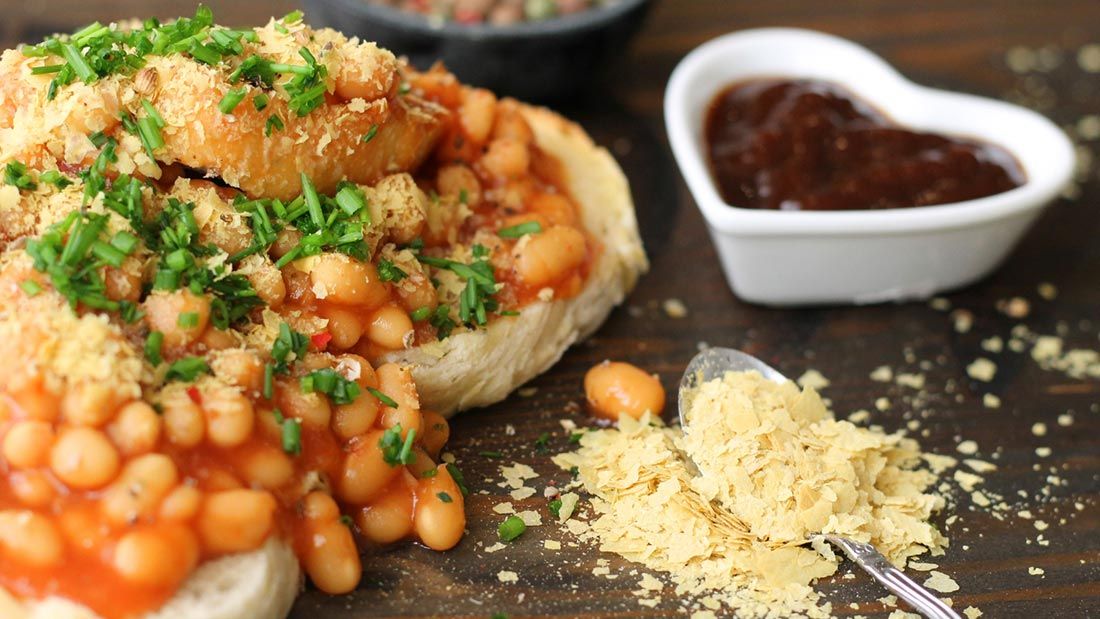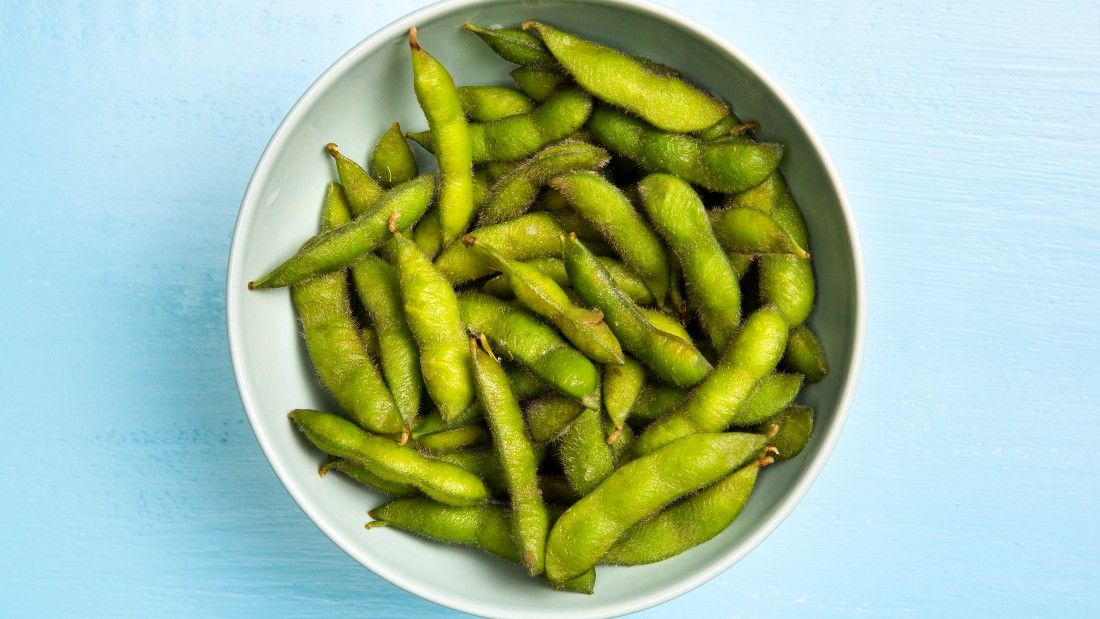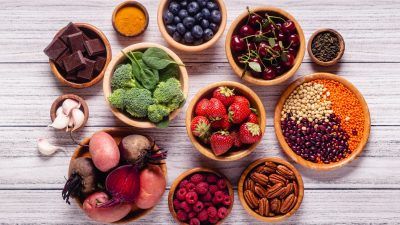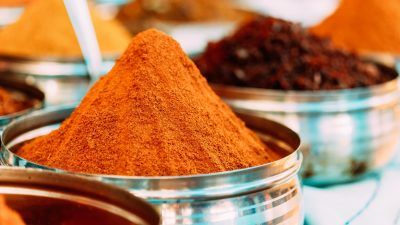10 Pulses to Pile on Your Plate

It would be hard to find a food that packs such a spectacular nutritional punch as pulses. And if you weren’t sure, pulses include beans, peas and lentils. Not only are they one of the healthiest foods available, they are also one of the cheapest. Frozen peas and tinned pulses retain much of their nutritional value, which makes them an extremely convenient and healthy food. Here are ten phenomenal pulses and their superpowers.
1. Peas (green peas, petits pois, sugar snap peas)
Don’t let the diminutive size of these little legumes fool you – peas are packed full of vitamins, minerals, antioxidants, and phytonutrients. Like carrots, peas contain lutein and zeaxanthin that help protect your eyes from chronic diseases and degeneration. Peas also contain anti-cancer chemicals, including coumestrol which protects against stomach cancer. In addition, these powerful green pods bolster our immune system, reduce the inflammation associated with diabetes, heart disease and arthritis, and their high protein and fibre content keeps our blood-sugar levels in check.
A cup of peas provides over eight grams of protein and small amounts of important minerals, such as calcium, magnesium and zinc, and a larger amount of iron, covering around one fifth of your daily needs. And there’s more – it’s an amazing source of B vitamins (except B12), vitamin A, vitamin C and vitamin K!
So, peas provide healthy energy, protein for body maintenance and many nutrients essential for your immune system, bone health, healthy vision and skin, muscle function, nerve signal transmission, blood clotting and oxygen transport by blood!
Try the Vegan Recipe Club’s Best Mushy Peas Ever.
2. Haricot beans
The haricot bean has given us one of the Britain’s best-loved staples – baked beans!
Beans are a great source of protein, complex (healthy) carbohydrates, several B vitamins, vitamin K, calcium, potassium, iron and zinc. Thanks to their protein and complex carbohydrates, they help stabilise blood sugar and because of that are great at preventing and managing type 2 diabetes. If baked beans are your go-to pulse, stick to the no added sugar varieties which are available in most brands.
100 grams of haricot beans contains approximately 8.2 grams of protein, 10.5 grams of fibre, 69 milligrams of calcium, 2.4 milligrams of iron, one milligram of zinc and only 0.6 grams of fat.
Try the Vegan Recipe Club’s Smoky Baked Beans.

3. Lentils
Lentils stand apart from many other pulses and legumes due to their incredibly high phenolic content – that means they are a great source of phytonutrients with various health-promoting properties. Lentils have been shown to have antioxidant, antidiabetic, anti-obesity, anti-hyperlipidemic (cholesterol-lowering), anti-inflammatory and anticancer effects.
A 100 gram serving of lentils also provides a significant amount of the recommended daily allowance of dietary folate. Folate is crucial for brain and nerve function, the production of the body’s genetic material (DNA and RNA), cell reproduction and together with vitamin B12 is needed for red blood cell formation. Along with vitamins B6 and B12, folic acid helps control blood levels of the amino acid homocysteine – high levels of which are associated with heart disease. So, don’t forget your B12 supplement to get the best of things.
Try the Vegan Recipe Club’s Ethiopian Lentil Stew (Mesir Wat).
4. Chickpeas
Chickpeas, also known as garbanzo beans, have been cultivated for millennia – at least for the last 8,000 years as far as we know.
One cup of chickpeas (160 grams) gives you an excellent protein dose – almost 12 grams! It also provides 10 grams of fibre, healthy carbohydrates, about a fifth of your daily folate requirements and small amounts of B vitamins and vitamins E and K. Chickpeas are also a mineral goldmine – one cup covers 10 per cent of your daily calcium, magnesium, iron and zinc requirements! It also offers a small dose of selenium, an important antioxidant.
No wonder people made it the star of many traditional meals, such as hummus, chana masala and falafel, and ground it into gram flour used to make farinata, poppadoms, bhajis and pakoras.
Try the Vegan Recipe Club’s Fabulous Falafel.
5. Kidney beans
Kidney beans contain natural phenolic compounds and carotenoids that are responsible for their colour but are also powerful antioxidants and have anti-inflammatory properties. Brown, black and red colours mean significantly more of these than pale colours. These pigments and their health-protective properties have been linked to a lower risk of cardiovascular disease, type 2 diabetes and even cancer.
The consumption of red and black beans has been shown to lower blood pressure and improve vascular function (blood flow through the body). Kidney beans also have anti-diabetic properties and studies show they may be suitable for diabetes treatment.
100 grams of cooked kidney beans contains around 8.7 grams of protein, 0.5 grams of fat, 6.4 grams of fibre, 35 milligrams of calcium, 2.2 milligrams of iron and one milligram of zinc.
Try the Vegan Recipe Club’s Simple Chilli.
6. Soya beans (aka edamame)
It’s hard to believe that such a healthy food has garnered such a bad reputation. Soya certainly doesn’t deserve its bad press. It doesn’t mess with your hormones or give you ‘man boobs’! In fact, there is no scientific evidence that soya harms human health, quite the opposite.
Soya is an excellent source of protein, containing all the essential amino acids (protein building blocks). It is also a good source of polyunsaturated ‘good’ fats (including omega-3 and -6), disease-busting antioxidants, B vitamins, potassium, magnesium and iron. Soya beans and products made using whole beans provide fibre, important for bowel health and lowering cholesterol.
The isoflavones (phytonutrients) in soya have been heavily studied and have been shown to help prevent diabetes, stabilise blood glucose, reduce osteoporosis and breast cancer risk.
Try the Vegan Recipe Club’s 10 Minute Edamame Spaghetti.

Image by Freepik
7. Black-eyed peas
Black-eyed peas are highly nutritious and like all the beans mentioned so far, contain high amounts of protein and fibre. Because of this they have been shown to help people effectively manage their weight, lower cholesterol therefore reducing cardiovascular disease risk, and improve digestion. The black-eyed pea originated in Africa but is popular in the Mediterranean region, known for its healthy dietary pattern.
Try the Vegan Recipe Club’s Easy Black Eyed Bean Curry.
8. Black beans
Alongside kidney beans, black beans have been shown to lower blood pressure and improve vascular function (blood flow through the body). When combined with other high glycaemic foods, such as white rice, black beans have also been shown to improve glycaemic response, meaning they are great at managing blood sugar levels.
Just as dark-coloured fruits are rich in antioxidants, so are dark-coloured beans. Black beans contain high amounts of anthocyanins, polyphenols and flavonoids, giving them an “elevated antioxidant capacity.” Find out more about antioxidants here.
100 grams of black beans contains 8.9 grams of protein, 8.7 grams of fibre and good amounts of iron and zinc.
Try the Vegan Recipe Club’s One Pot Cheesy Black Bean Enchiladas.
9. Butter beans (aka lima beans)
Butter beans are a particularly starchy bean, and can give a more creamy, potato-like texture when added to dishes. Butter beans are a good source of soluble and insoluble fibre. The soluble fibre is good for blood sugar management and they may also lower blood cholesterol and reduce colorectal risk due to their high insoluble fibre content. Butter beans are also an especially good source of iron, with 100 grams containing around 25 per cent of your daily requirement.
Try the Vegan Recipe Club’s Red Pepper & Butter Bean Bada Boom.
10. Broad beans
Broad beans, also known as fava beans, can be grown in the UK between May and September. Beans are a great source of protein, complex (healthy) carbohydrates, several B vitamins, vitamin K, calcium, potassium, iron and zinc. Broad beans contain lectins, a chemical which has been shown to slow or even halt bowel cancer in its tracks. There is also evidence to suggest that broad beans can lessen the symptoms of Parkinson’s disease as they contain levodopa – which is used as a medication for the disease.
Try the Vegan Recipe Club’s Vegetable Paella.
With the exception of the jellybean, all beans are extremely good for you. It is important they are always consumed cooked (except jellybeans again!) as eating them undercooked or raw can cause serious health problems. You can avoid this potential problem by buying tinned beans as the hard work has been done for you. If you find beans make you bloated or gaseous, start with a small portion and build up slowly giving your gut bacteria time to adapt to all the fibre.







